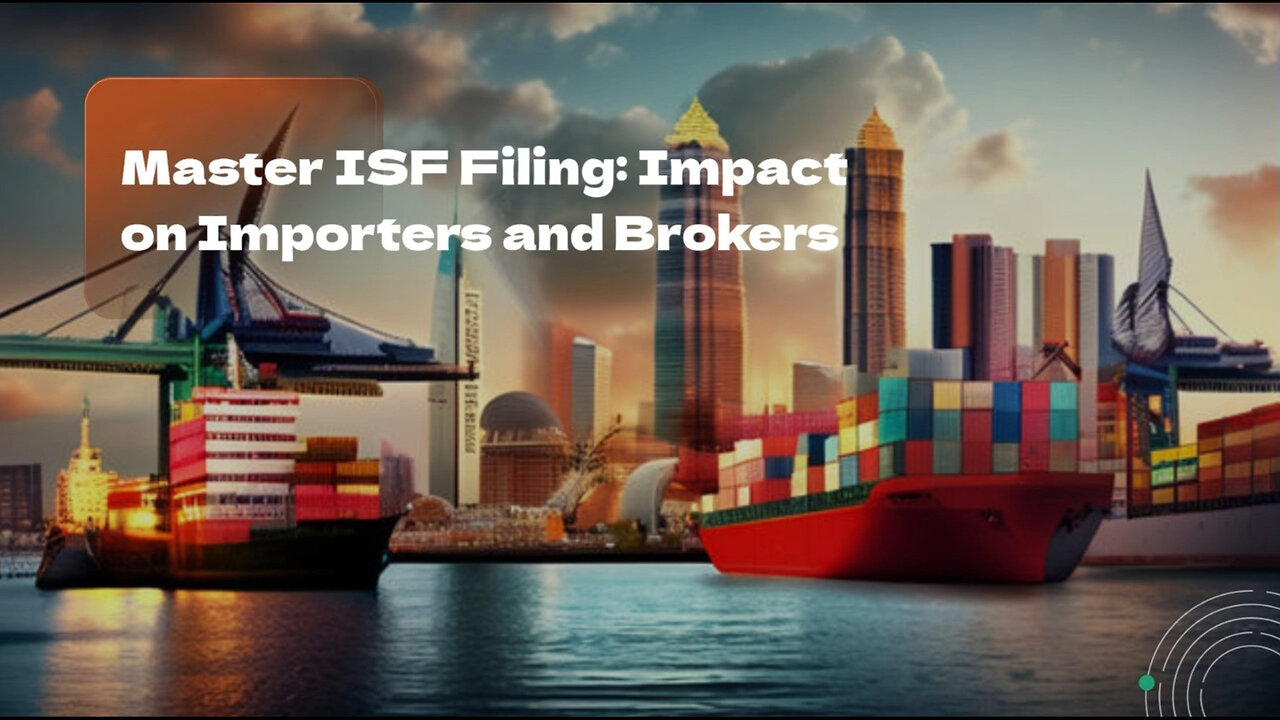Premium Only Content

Demystifying ISF: How it Impacts Importers, Carriers, and Customs Brokers
License To Import // 323-578-6432 // [email protected] // www.licensetoimport.com
The Importer Security Filing (ISF) is a requirement enforced by US Customs and Border Protection (CBP) for all cargo shipments entering the United States by ocean. It is the responsibility of importers to furnish accurate and timely information about the imported goods, with the ISF filing being submitted at least 24 hours before the cargo is loaded onto the vessel departing from the foreign port. Failure to comply with the ISF requirements can result in monetary penalties and shipment delays. Carriers are also affected by ISF, as they are required to refuse loading any cargo that does not have a valid ISF on file. This requirement aims to enhance security and streamline the flow of goods. Customs brokers, acting as intermediaries between importers and CBP, play a crucial role in ensuring ISF compliance and managing the customs clearance process. They work closely with importers to gather the necessary information, verify accuracy, and facilitate communication between all parties involved in the import process. By providing guidance and expertise, customs brokers help importers navigate the complexities of customs regulations. Overall, ISF is an essential aspect of international trade that benefits the security and efficiency of cargo shipments entering the United States by ocean.
#usimportbond
#isfcustomsbroker
#uscustomsclearing
#isfentry
Video Disclaimer Here: This video is solely for education and is not endorsed by any US government agency.
00:18 - Importer Security Filing (ISF) is a requirement enforced by U.S. Customs and Border Protection (CBP) for all cargo shipments entering the United States by ocean.
00:47 - Importers are responsible for submitting accurate and timely information about imported goods at least 24 hours before loading onto the vessel, working closely with customs brokers to ensure compliance to avoid penalties and delays.
01:21 - Carriers must verify valid ISF filings by importers before accepting cargo, as CBP regulations require them to refuse loading any cargo without a valid ISF, aiming to enhance security and streamline trade flow.
01:52 - Customs brokers play a crucial role in managing ISF compliance, gathering necessary information, reviewing data accuracy, and facilitating communication between importers, CBP, and other parties involved in the import process to ensure smooth customs clearance and compliance with regulations.
-
 1:27
1:27
License To Import
17 days agoHow To File ISF For Christmas Hats
91 -
 LIVE
LIVE
TimcastIRL
1 hour agoGOP Declares Biden Pardons VOID Over Autopen, DOJ Announces Investigation | Timcast IRL
26,086 watching -
 LIVE
LIVE
Laura Loomer
1 hour agoEP153: DEPORT MAMDANI!
462 watching -
 UPCOMING
UPCOMING
Flyover Conservatives
20 hours agoAre ‘Aliens’ Really Demons? The Coming Digital ID System - Dr. Stella Immanuel; Frequencies of Control - Leigh Dundas | FOC Show
4.17K1 -
 LIVE
LIVE
Dr Disrespect
12 hours ago🔴LIVE - DR DISRESPECT - BATTLEFIELD 6 - REDSEC LAUNCH - BATTLE ROYALE
2,494 watching -
 LIVE
LIVE
Sarah Westall
56 minutes agoARPA-H and the Weaponized Architecture for Total Dominance & Surveillance w/ Alix Mayer
162 watching -
 LIVE
LIVE
SpartakusLIVE
12 hours agoREDSEC BATTLE ROYALE || Battlefield 6 w/ The Boys
257 watching -
 33:50
33:50
Producer Michael
6 hours agoInside a FORTRESS Containing $2BILLION in Gold and Silver!
691 -
 UPCOMING
UPCOMING
Anthony Rogers
1 day agoEpisode 388 – Gabi Garcia
55 -
 UPCOMING
UPCOMING
AlaskanBallistics
1 hour agoI Love this Gun Podcast #70